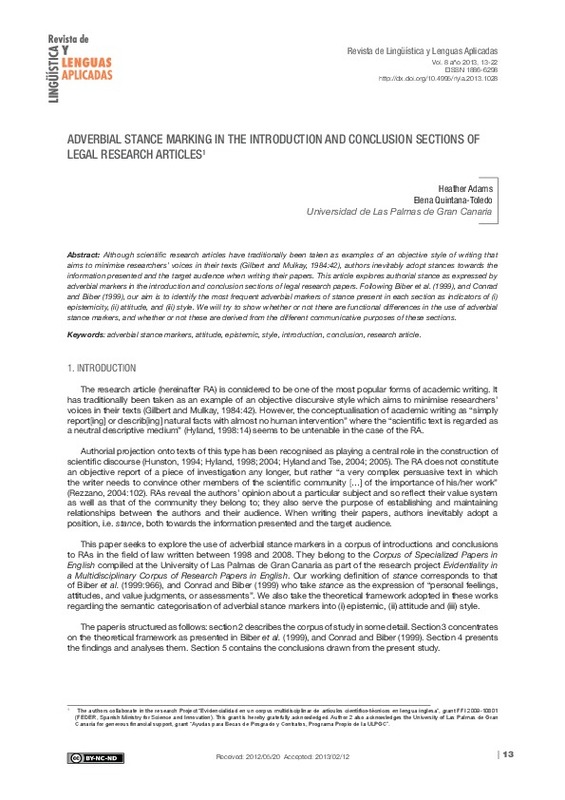Alonso-Almeida, F. and Cruz-García, L. (Forthcoming). "The vaue of may as an evidential and epistemic marker in English medical abstracts", Studia Anglica Posnaniensia.
Anthony, L. (1999). "Writing research article introductions in software engineering: How accurate is a standard model?", IEEE Transactions on Professional Communication 42/1, 38-46. http://dx.doi.org/10.1109/47.749366
Bhatia, V. K. (1997). "Genre-mixing in academic introductions", English for Specific Purposes 16, 181-195. http://dx.doi.org/10.1016/S0889-4906(96)00039-7
[+]
Alonso-Almeida, F. and Cruz-García, L. (Forthcoming). "The vaue of may as an evidential and epistemic marker in English medical abstracts", Studia Anglica Posnaniensia.
Anthony, L. (1999). "Writing research article introductions in software engineering: How accurate is a standard model?", IEEE Transactions on Professional Communication 42/1, 38-46. http://dx.doi.org/10.1109/47.749366
Bhatia, V. K. (1997). "Genre-mixing in academic introductions", English for Specific Purposes 16, 181-195. http://dx.doi.org/10.1016/S0889-4906(96)00039-7
Biber, D., Johansson, S., Leech, G., Conrad, S. and Finegan, E. (1999). Longman grammar of spoken and written English. Essex: Longman.
Carretero, M. (2004). "The role of evidentiality and epistemic modality in three English spoken texts from legal proceedings", in J. Marín-Arrese (ed.) Perspectives on evidentiality and epistemic modality. Madrid: Editorial Complutense, 25-62.
Chafe, W. (1986). Evidentiality in English conversation and academic writing, in W. Chafe and J. Nichols (eds.) Evidentiality. The linguistic coding of epistemology. Norwood, NJ: Ablex, 261-272.
Chafe, W. and Nichols, J. (eds.). (1986). Evidentiality. The linguistic coding of epistemology. Norwood, NJ: Ablex.
Conrad, S. and Biber, D. (1999). "Adverbial marking of stance in speech and writing", in S. Hunston and G. Thompson (eds.) Evaluation in text. Authorial stance and the construction of discourse. New York: Oxford University Press, 56-73.
Cooper, C. (1985). Aspects of article introductions in IEEE publications. Aston: Aston University MSc Dissertation.
Cornillie, B. (2009). "Evidentiality and epistemic modality. On the close relationship between two different categories", Functions of Language 16/1, 44-62. http://dx.doi.org/10.1075/fol.16.1.04cor
Crookes, G. (1986). "Towards a validated analysis of scientific text structure", Applied Linguistics 7, 57-70. http://dx.doi.org/10.1093/applin/7.1.57
De Haan, F. (1999). "Evidentiality and epistemic modality: Setting boundaries", Southwest Journal of Linguistics 18, 83-101.
Dudley-Evans, T. (1986). "Genre analysis: An investigation of the introduction and discussion sections of MSc dissertations", in M. Coulthard (ed.) Talking about text. Birmingham: English Language Research, 128-145.
Dudley-Evans, T. (1994). "Genre analysis: An approach to text analysis for ESP", in M. Coulthard (ed.) Advances in written text analysis. London: Routledge, 219-228.
Dudley-Evans, T. (1997). "Genre models for the teaching of academic writing to second language speakers: Advantages and disadvantages", in T. Miller (ed.) Functional approaches to written text: Classroom applications. Washington, DC: USIA, 150-159.
Dudley-Evans, T. (2000). "Genre analysis: A key to a theory of ESP?", IBÉRICA 2, 3-11.
Gilbert, N. and Mulkay, M. (1984). Opening Pandora's box: A sociological analysis of scientists' discourse. Cambridge: Cambridge University Press.
Hoye, L. (1997). Adverbs and modality in English. Essex: Longman.
Hunston, S. (1994). "Evaluation and organization in a sample of written academic discourse", in M. Coulthard (ed.) Advances in written text analysis. London: Routledge, 191-218.
Hunston, S. and Thompson, G. (1999). Evaluation in text. Authorial stance and the construction of discourse. New York: Oxford University Press.
Hyland, K. (1996). "Writing without conviction? Hedging in science research articles", Applied Linguistics 17/4, 433-454. http://dx.doi.org/10.1093/applin/17.4.433
Hyland, K. (1998). Hedging in scientific research articles. Amsterdam and Philadelphia: John Benjamins.
Hyland, K. (2004). "Disciplinary interactions: Metadiscourse in L2 postgraduate writing", Journal of Second Language Writing 13, 133-151. http://dx.doi.org/10.1016/j.jslw.2004.02.001
Hyland, Ken. (2005). "Stance and engagement: A model of interaction in academic discourse", Discourse Studies 7/2, 173-192. http://dx.doi.org/10.1177/1461445605050365
Hyland, K. and Tse, P. (2004). "Metadiscourse in academic writing: A reappraisal", Applied Linguistics 25/2, 156-177. http://dx.doi.org/10.1093/applin/25.2.156
Hyland, K. and Tse, P. (2005). "Hooking the reader: A corpus study of evaluative that in abstracts", English for Specific Purposes 24, 123-139. http://dx.doi.org/10.1016/j.esp.2004.02.002
Kranich, S. (2009). "Epistemic modality in English popular scientific texts and their German translations", Trans-kom 2/1, 26-41.
Ngozi-Nwogu, K. (1997). "The medical research paper: Structure and functions", English for Specific Purposes 16/2, 119-138. http://dx.doi.org/10.1016/S0889-4906(97)85388-4
Nuyts, J. (2001). Epistemic modality, language and conceptualization. A cognitive-pragmatic perspective. Amsterdam and Philadelphia: John Benjamins.
PMCid:93191
Ortega-Barrera, I. and Torres-Ramírez, A. (2010). "Estudio sobre los abstracts de artículos de investigación informáticos: Evidencialidad y modalidad textual", Revista de Lingüística y Lenguas Aplicadas 5, 141-153. http://dx.doi.org/10.4995/rlyla.2010.764
Palmer, F. (1979). Modality and the English modals. New York: Longman.
Posteguillo, S. (1999). "The schematic structure of computer science research articles", English for Specific Purposes 18/2, 139-160. http://dx.doi.org/10.1016/S0889-4906(98)00001-5
Precht, K. (2003). "Stance moods in spoken English: Evidentiality and affect in British and American conversation", Text 23/2, 239-257. http://dx.doi.org/10.1515/text.2003.010
Rezzano, N. S. (2004). "Modality and modal responsibility in research articles in English", in R. Fachinetti and F. Palmer (eds.) English modality in perspective. Genre analysis and contrastive studies. Germany: Peter Lang GmbH, 101-118.
Ruiying, Y. and Allison, D. (2003). "Research articles in applied linguistics: Moving from results to conclusions", English for Specific Purposes 22, 365-385. http://dx.doi.org/10.1016/S0889-4906(02)00026-1
Salager-Meyer, F. (1994). "Hedges and textual communicative function in medical English written discourse", English for Specific Purposes 13, 149-170. http://dx.doi.org/10.1016/0889-4906(94)90013-2
Salager-Meyer, F. (1995). "I think that perhaps you should: A study of hedges in written scientific discourse", Journal of TESOL France 2, 127-143.
Samraj, B. (2002). "Introductions in research articles: Variation across disciplines", English for Specific Purposes 21, 1-17. http://dx.doi.org/10.1016/S0889-4906(00)00023-5
Simon-Vandenbergen, A. M. (2008). "Almost certainly and most definitely: Degree modifiers and epistemic stance", Journal of Pragmatics 40, 1521-1542. http://dx.doi.org/10.1016/j.pragma.2008.04.015
Swales, J. (1990). Genre analysis: English in academic and research settings. Cambridge: Cambridge University Press.
PMCid:1664324
Van der Auwera, J. and Plungian, V. (1998). "On modality's semantic map", Linguistic Typology 2, 79-124.
http://dx.doi.org/10.1515/lity.1998.2.1.79
[-]








